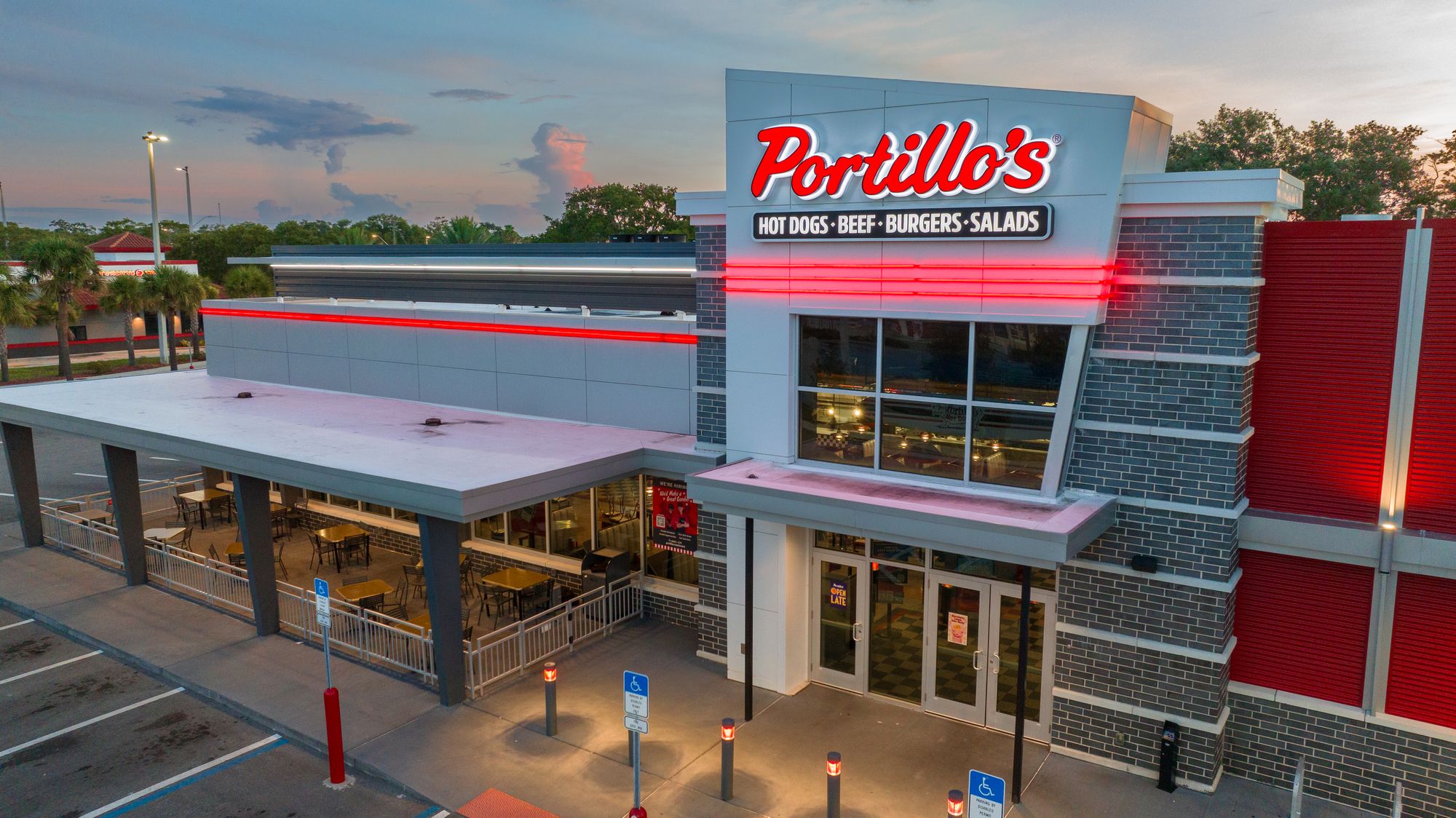Portillo’s Franchise FDD, Profits & Costs (2025)

Portillo’s is a fast-casual restaurant chain specializing in Chicago-style street food. It was founded in 1963 by Dick Portillo, who started with a small trailer in Villa Park, Illinois, called “The Dog House,” with an investment of just $1,100.
Over the years, the brand has evolved and expanded significantly. Known for its famous Chicago-style hot dogs, Italian beef sandwiches, salads, cheese fries, and homemade chocolate cake, Portillo’s has built a reputation for offering an authentic Chicago food experience.
The Italian beef is slow-roasted, thinly sliced, and served on fresh French bread with its unique blend of seasonings, making its offerings stand out in the market. The franchise has grown beyond its Chicago roots, with over 70 locations spread across several states, including Florida, Wisconsin, and Texas.
In recent years, Portillo’s has continued to expand, opening new locations in major metropolitan areas and even going public on the NASDAQ as $PTLO in 2021.
Portillo’s is not currently franchising, and the company’s growth has been driven through corporate-owned locations rather than traditional franchising models.
Initial Investment
How much does it cost to start a Portillo’s franchise? Portillo’s does not offer franchise opportunities, as all of its locations are company-owned.
Therefore, it is not possible to start a Portillo’s franchise, and there is no associated cost for franchising with the company.
For similar quick-service Italian-style restaurant franchises, however, the initial investment is on average $1,330,000.
In comparison, for example, Fazoli’s (an Italian fast-casual restaurant franchise brand) requires an investment upfront of $378,000 up to $2,329,000 for a franchised location. Here are a few competitors in comparison:
| Franchise | Initial investment |
|---|---|
| Fazoli’s | $378,000 – $2,329,000 |
| Villa Italian Kitchen | $303,000 – $1,016,000 |
Average Revenue (AUV)
How much revenue can you make with a Portillo’s franchise? Since Portillo’s does not franchise its stores and all locations are company-owned, Portillo’s does not publish a Franchise Disclosure Document. Therefore, it does not disclose the average revenue of its stores.
However, a similar Fast-Casual Restaurant franchise makes on average $1,198,000 in revenue (AUV) per year. For example, a Fazoli’s franchised restaurant makes on average $1,094,000 in revenue per year.
| Franchise | Revenue (AUV) |
|---|---|
| Fazoli’s | $1,094,000 |
| Villa Italian Kitchen | $635,000 |
Frequently Asked Questions
How many Portillo’s locations are there?
Portillo’s currently has over 70 company-owned locations across several states in the United States, including Illinois, Florida, Wisconsin, and Texas. The brand continues to expand its reach with new locations planned in additional states.
What is the total investment required to open a Portillo’s franchise?
Portillo’s does not offer franchise opportunities and therefore, it is not possible to establish the initial investment to start a Portillo’s franchise.
However, the total investment required to open a franchised store similar to Portillo’s franchise ranges from $61,000 to $16,113,000.
What are the ongoing fees for a Portillo’s franchise?
Since Portillo’s does not offer franchises and all stores are company-owned, the ongoing fees such as royalty fees or advertising fees associated with franchising the brand are not readily available.
Yet, similar fast-casual franchises in the industry charge an average of 6% in royalty fees and 1%-4% in advertising fees (e.g. Villa Italian Kitchen).
What are the financial requirements to become a Portillo’s franchisee?
The majority of Portillo’s locations are company-owned, and the brand does not offer opportunities for independent ownership or franchising. Therefore, it is not possible to meet any financial requirements or apply to become a franchisee with Portillo’s.
For fast-casual franchises similar to Portillo’s, the financial requirements for the fast-casual restaurant industry typically include a minimum net worth of around $1 million to $2 million. For liquid assets, many franchisors require a range of $500,000 to $1 million.
These amounts can vary based on the brand and its specific financial structure, but these figures are common benchmarks for potential franchisees in the industry.
How much can a Portillo’s franchise owner expect to earn?
Since Portillo’s is entirely company-owned and does not operate as a franchise, there is no earning disclosure for a Portillo’s franchise.
Now, assuming the average gross sales for a retail franchise similar to a Portillo’s franchise of $1,198,000 per store. And assuming a 15% operating profit margin, $1,198,000 yearly revenue would result in about $180,000 operating profit per year.
Who owns Portillo’s?
Portillo’s is a publicly-traded company listed on the NASDAQ under the ticker symbol PTLO. While it was originally founded by Dick Portillo, the company underwent an IPO in 2021, and its ownership is now distributed among public shareholders and institutional investors.
Disclaimer
Disclaimer: This content has been made for informational and educational purposes only. SharpSheets is an independent educational resource and is not affiliated with, endorsed by, or representing any franchisor mentioned on this website. Where noted, figures are taken from the franchisor’s Franchise Disclosure Document (FDD). In some cases, we may provide independent calculations or estimates based on publicly available information. We do not make any representation or warranties with respect to the accuracy, applicability, fitness, or completeness of the information presented in the article. You should not construe any such information or other material as legal, tax, investment, financial, or other professional advice. Nothing contained in this article constitutes a solicitation, recommendation, endorsement, advertisement, or offer to buy or sell any franchises, securities, or other financial instruments in this or in any other jurisdiction in which such solicitation or offer would be unlawful under the franchise and/or securities laws of such jurisdiction.
All content in this article is information of a general nature and does not address the detailed circumstances of any particular individual or entity. Nothing in the article constitutes professional and/or financial and/or legal advice, nor does any information in the article constitute a comprehensive or complete statement of the matters discussed or the law relating thereto. You alone assume the sole responsibility of evaluating the merits and risks associated with the use of any information or other content in this article before making any decisions based on such information or other content.




